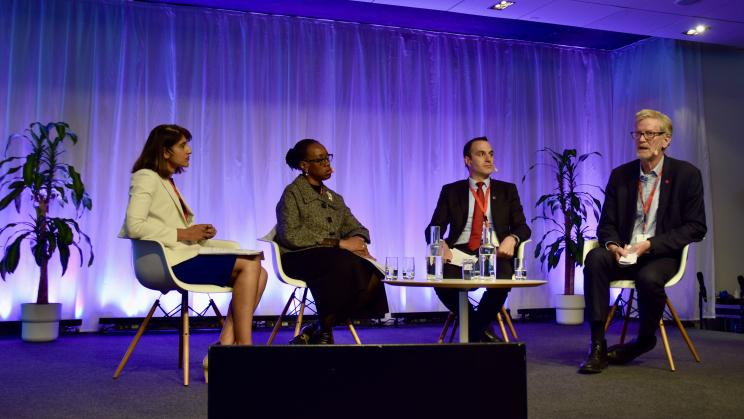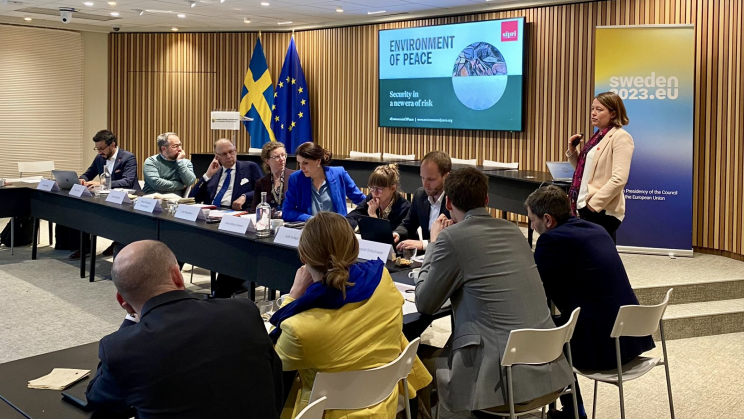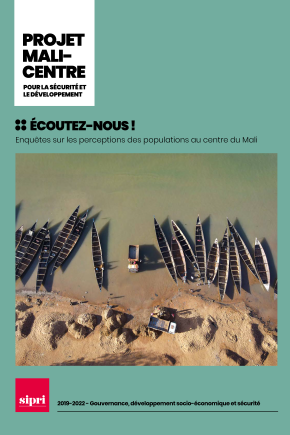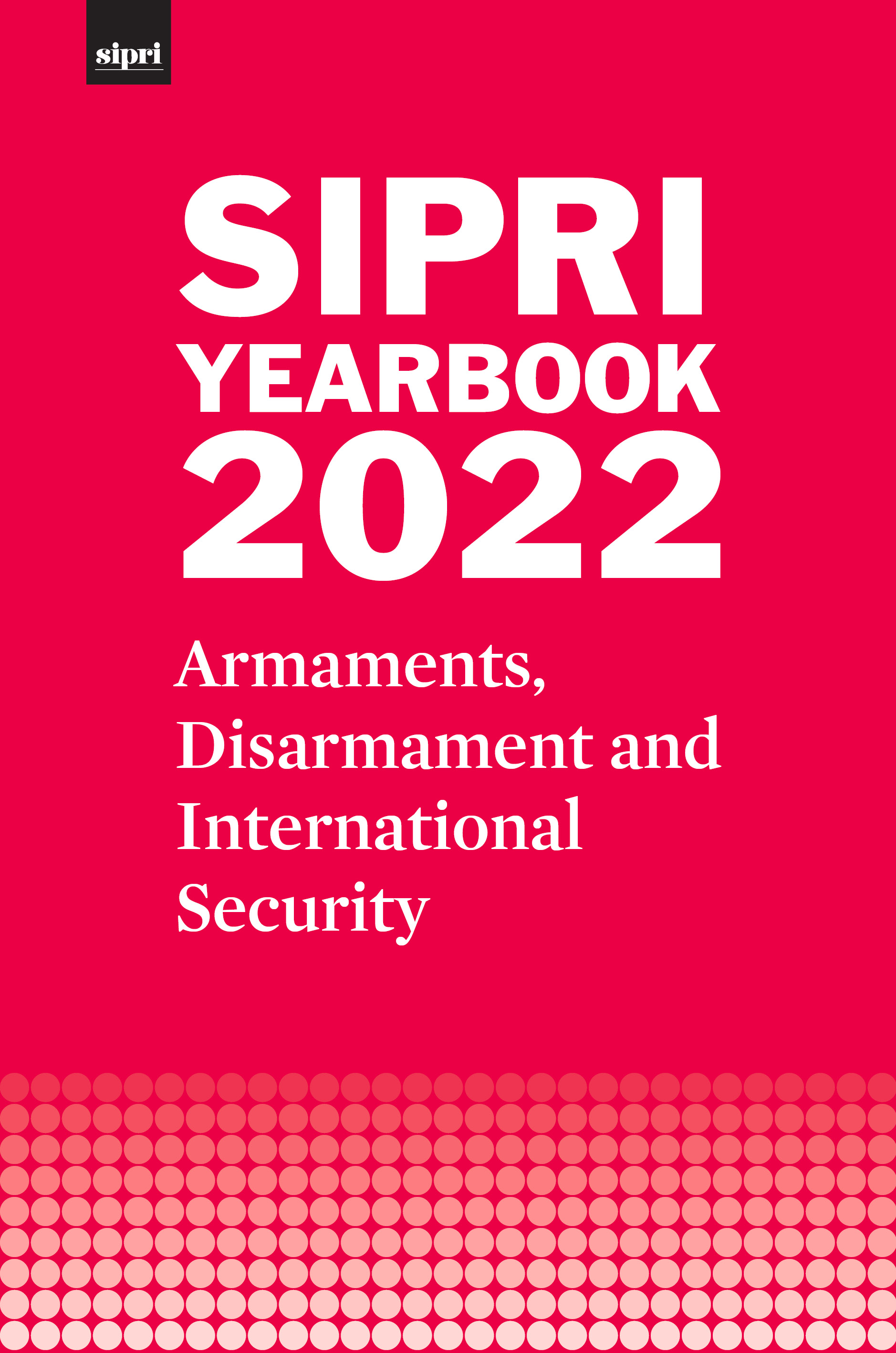|
| NEWS |
 |
| New SIPRI data—Multilateral peace operations |
|
This month SIPRI released new data on multilateral peace operations. A topical backgrounder summarizes the key findings from the new data along with important developments related to multilateral peace operations during the year. It also includes six interactive visualizations that capture trends in the data. The number of international personnel deployed to multilateral peace operations around the world increased by 2.79 per cent during 2022, reaching 114 984 by 31 December. The biggest year-on-year changes in personnel numbers were an increase of 3771 (4.2 per cent) in sub-Saharan Africa and a decrease of 541 (–6.7 per cent) in Europe.
|
|
|
Read more | Download the SIPRI Map of Multilateral Peace Operations
|
|
|
 |
| 2023 Stockholm Forum: Seeking Solutions for Turbulent Times |
|
On 15–17 May, over 300 participants from 56 countries and over 40 partner organizations convened in person for the annual Stockholm Forum on Peace and Development. The topic at the centre of this year’s Forum was ‘Seeking Solutions for Turbulent Times’. In his welcoming address, Stefan Löfven, Chair of the SIPRI Governing Board, laid out the compounding and parallel challenges behind our turbulent times, and he opened the Forum as a safe space for exploring new ideas. ‘We will not stop at describing the problems. Our aim is to walk out of here with new, innovative solutions to address the complex, turbulent times we face,’ said Löfven.
|
|
|
Read more
|
|
|
 |
| Untangling the World’s Crises: Where Do We Start? |
|
Apart from Russia’s war in Ukraine and the civil war in Sudan, there are armed conflicts in 55 other countries. Geopolitical tensions are intensifying both at the global level and in key volatile regions such as the Gulf. In addition, the pressure of climate change is increasing and the food insecurity crisis is sharpening. Against this backdrop, the SIPRI Governing Board convened a public conversation on how to untangle this complexity and where to start.
|
|
|
Read more | Watch the event
|
|
|
 |
| SIPRI discusses climate and security research in Brussels |
|
Last month, SIPRI experts and researchers travelled to Brussels to participate in several events convened by the Swedish Permanent Representation to the European Union (EU) as part of the Swedish Presidency of the Council of the EU. The trip was a significant opportunity to engage in bilateral discussions with diplomats, policymakers, researchers and practitioners from both the climate change and security sectors.
|
|
|
Read more
|
|
|
 |
| Swedish Ambassador Michael Sahlin on the implications of the Turkish elections |
|
In this SIPRI Conversation, Stephanie Blenckner, Director of Communications at SIPRI, speaks with Ambassador Michael Sahlin, Distinguished Associate Fellow at SIPRI, about the implications of the Turkish elections. Ambassador Sahlin posits that the main focus for the Turkish population is the economy, which has been declining under the current regime. However, factors such as President Erdogan’s strong political position and the opposition’s plans for economic and democratic reforms may also come into play.
|
|
|
Watch the SIPRI Conversation
|
|
|
 |
| SIPRI Spotlight Interview: Laura Chinchilla, Former President of Costa Rica |
|
On 27 April, SIPRI invited Costa Rica’s former President Laura Chinchilla for an informal discussion on gender, peace and security. President Chinchilla is the country’s first woman to serve in this role. Chinchilla argues that the most significant security challenge in Latin America is organized crime. Addressing this issue requires regional and global cooperation to enhance police services and implement effective social policies.
|
|
|
Watch the SIPRI Spotlight Interview
|
|
|
|
|
|
 |
| External articles |
|
The following articles by SIPRI experts were recently published:
|
|
|
| RECENT EVENTS |
| |
| 8 May 2023 |
| SIPRI hosts roundtable discussion on climate, peace and security |
|
On 8 May, SIPRI, in cooperation with the Nordic Africa Institute and the Friedrich-Ebert-Stiftung, hosted an event on ‘Climate, Peace and Security in West Africa and the Sahel: Towards Effective Responses’. The event was held in a roundtable format with researchers, practitioners and policymakers from other research organizations and Swedish government institutions. Notable attendees included Robert Rydberg, Swedish Ambassador for Climate and Security.
|
|
Read more
|
|
| STAFF NEWS |
SIPRI is currently accepting applications for:
- Joint internship, SIPRI’s Middle East and North Africa Programme; and SIPRI’s Military Expenditure and Arms Production Programme (Closing date: 31 May)
- Programme Director and Senior Researcher, SIPRI’s China–Asia Security Programme (Closing date: 4 June)
- Internship, SIPRI’s Climate Change and Risk Programme (Closing date: 5 June)
|
|
Read more
|
|
|
| PUBLICATIONS |
 |
| ‘Listen to Us!’: Local Perceptions of Populations in Central Mali |
|
In the space of a decade, the socio-economic, political and security conditions for millions of people living in central Mali has deteriorated. This report concludes four years of research carried out by SIPRI and its partner Point Sud during 2019–22. It presents local understandings of governance, development and security—gathered through a mixed-methods approach—with 12 rounds of surveys and complemented by over 700 interviews and focus groups with central Malians. The report offers evidence-based data to address the needs of populations by advocating for multi-level conflict resolution strategies and providing a long-term vision for peace and security.
|
|
Read the SIPRI Partnership Publication
|
|
|
 |
| Improving the Prospects for Peace in South Sudan: Spotlight on Stabilization |
|
South Sudan is home to one of the world’s worst hunger crises, a consequence of decades of armed conflict and devastating extreme weather events. Conflict, climate change and hunger have forcibly displaced nearly seven million people, out of a population of 11 million. The World Food Programme (WFP) operates in the middle of this intersection. This report analyses the impact of that assistance, drawing out the contribution of WFP’s programming to enhancing stability through a reduction in violence and improved basic physical security.
|
|
Read the report
|
|
|
 |
| The World Food Programme’s Contribution to Improving the Prospects for Peace in Sri Lanka |
|
The WFP has supported food security and nutrition in Sri Lanka since 1968. Based on research conducted in the Monaragala district in the south, and the Mullaitivu district in the north, on gender dynamics and community resilience, this report aims to identify the ways in which selected WFP projects impact the prospects for peace. The study analyzes the linkages between gender and social cohesion of two WFP resilience-building projects.
|
|
Read the report
|
|
|
 |
| Enhancing the Conflict Sensitivity of National Adaptation Plans |
|
Climate change’s impact on conflict risks highlights the need to integrate conflict considerations into national adaptation plans (NAPs). This study examined the NAPs of the ten least peaceful countries submitted to the United Nations Framework Convention on Climate Change by November 2022. The report reveals inconsistent references to conflict and a lack of systematic consideration. It identifies three key actors with the potential to enhance the conflict sensitivity of NAPs
|
|
Read the SIPRI Partnership Publication
|
|
|
.jpeg) |
| Three Steps to Including Conflict Considerations in the Design of Climate Change Adaptation Projects |
|
In fragile and conflict-affected countries, climate change adaptation projects have the potential to influence conflict dynamics—and either increase or reduce conflict risks—depending on their design and implementation. This report recommends a three-step approach to facilitating the consideration of conflict risks in the design of climate change adaptation projects that involves analysing the existing climate–conflict dynamics, assessing a project’s potential influence on them and, finally, integrating the insights gained from the first two steps into the project’s design.
|
|
Read the SIPRI Partnership Publication
|
|
|
 |
| SIPRI Yearbook 2022 |
SIPRI Yearbook 2022 presents a combination of original data in areas such as world military expenditure, international arms transfers, arms production, nuclear forces, armed conflicts and multilateral peace operations with state-of-the-art analysis of important aspects of arms control, peace and international security. In addition to its detailed coverage of nuclear arms control and non-proliferation issues, the latest edition of the SIPRI Yearbook includes
- insight on developments in conventional arms control in 2021;
- regional overviews of armed conflicts and conflict management;
- in-depth data and discussion on military expenditure, international arms transfers and arms production; and
- comprehensive coverage of efforts to counter chemical and biological security threats.
|
|
Browse the contents page | Download the summary (PDF) | Download the sample chapter on world nuclear forces (PDF) | Order SIPRI Yearbook 2022
|
|
|
| |
|
|
|
|